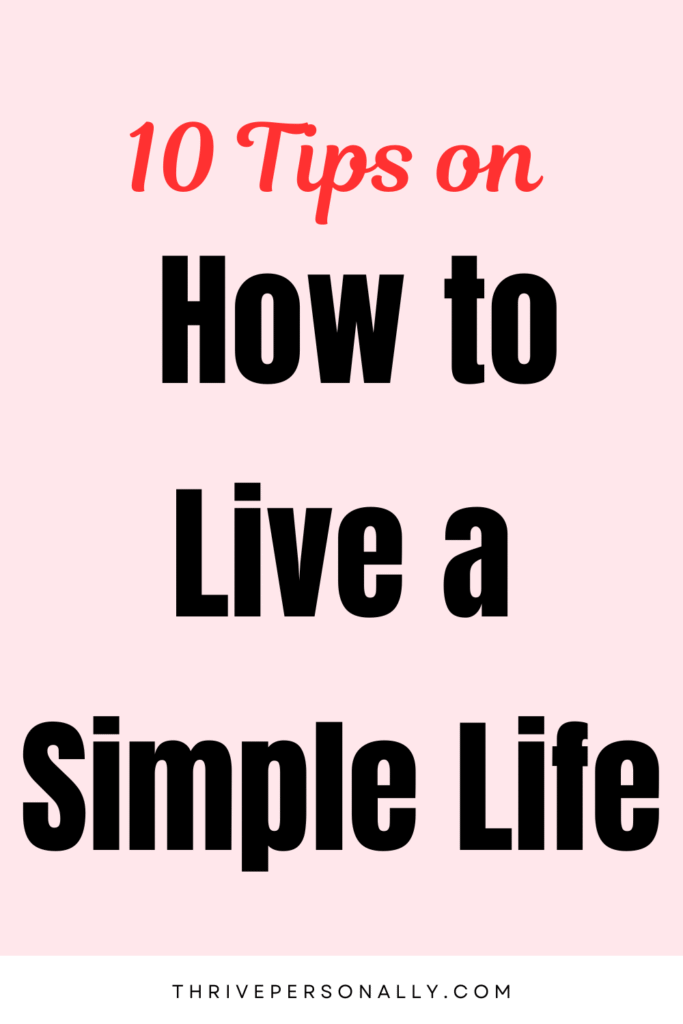It may be quite noisy in this life. There is too much to be done. There is way too much to possess. Too many things to pursue. It is possible to wake up already tired—and not from something physical—but because of how crowded and untidy your life feels. You might often think: There must be more to it than this. And then you may long to breathe more freely, without being squeezed from all ends.
If you’ve ever felt this way, you are not alone. Thousands of people are searching for a better way to live. A slower path. One that is quieter. That is where simple living comes in. It doesn’t mean throwing away all your belongings or forgetting everything about your life. It also doesn’t mean being poor or lazy. Simple living is about creating room in your life for what truly matters to you.
10 Tips on How to Live a Simple Life
1. Gain Insights on the Meaning of Simplicity to You
The first step is to think: What would a simple life look like for me?
This answer is different for everyone. For some, it could mean more time with family and less working late. For others, it might mean owning fewer things or having a quieter mind. There are no hard and fast rules to simplicity. It is a personal path.
Sit down and ask yourself what you really want. Is it peace? Space? Time to enjoy little things like a quiet lunch, a walk outside, or a deep conversation? Once you have your own picture of what a simpler life is, it becomes easier to move toward it.
Read also: 8 Simple Things You Can Do for a Mental Detox
2. Cut Down Clutter in Your Space
For many people, simple living begins by decluttering their homes. And it makes sense. When your space is filled with things you no longer need, your mind can feel the same way.
That bulging closet or those drawers you never open? They weigh on you in ways you might not even notice. A study from Princeton University showed that too much visual information—like clutter—can reduce your ability to focus and think clearly. Mess distracts your brain, even when you think you’re ignoring it. Read more about the study here.
Start small. Maybe clear one shelf or tidy one room. You don’t need to throw out everything—just create space. As Leonardo Da Vinci once said: Never possess more than you use. Keep what gives you peace or adds value to your daily life.
Read also: 7 Vital Things You Need to Add to Your Declutter List
3. Master Saying “No” More Often
A huge part of simple living is learning to say no—to things, to invitations, to people’s expectations that don’t line up with your priorities. Your time and energy are limited. If you spend them trying to do everything or please everyone, you’ll feel empty.
Saying no is not selfish. In fact, it’s one of the kindest things you can do for yourself and for others. When you say no to what drains you, you say yes to what fills you. You become more present, more relaxed, and more real.
You don’t need to explain yourself every time. A simple sentence like “I can’t take on that responsibility right now” is enough. Practice using it. And remember: it’s your life.
Read also: 15 Reasons Why Saying No is a Life Skill You Need to Learn
4. Reduce the Time You Spend on Screens
Today, many people live in constant contact with screens—phones, laptops, TVs, tablets. While screens can be useful, they often steal your attention, time, and peace if left unchecked. You may check one message, then suddenly find yourself lost in hours of scrolling.
Simple living means protecting your time—and your mind. Research from the National Institutes of Health (NIH) has shown that excessive screen time can increase stress and reduce focus. Explore the NIH study here.
Try checking your phone less often. Set a “screen-off” time—maybe an hour before bed or after waking. You’ll feel the silence. You’ll start noticing your thoughts again. That quiet space is where peace begins.
5. Take Time to Be Still in Silence
Silence is powerful—but rare. Many people fear silence because they’ve become used to constant noise: music, talking, TV, alerts. But true silence isn’t empty. It’s full of clarity.
Just 10 minutes of silence each day can help you slow down, breathe deeper, and think clearer. You might sit on your porch. You might lie in bed and just think. These small quiet moments refresh your spirit and calm your mind.
In silence, you hear what matters.
6. Learn to Get Along with Having Less
Letting go of the idea that “more is better” is one of the hardest but most rewarding parts of simple living. The world constantly pushes the idea that more is always good—more clothes, more gadgets, more followers, more money. But often, those who have more also feel more stressed.
By choosing a simple life, you begin to accept that enough is enough. You let go of endless chasing. You start to live.
That doesn’t mean you give up comfort completely. It means becoming thoughtful. You might skip five cheap things and instead enjoy one meaningful item. You stop collecting stuff in your house—and start collecting meaning in your life.
The real freedom often starts when you realize you don’t need more.
7. Make Better Daily Rhythms
Simple routines support a simple life. These are small, repeated actions that shape your day: a morning walk, a quiet lunch, reading before bed.
You don’t need a strict schedule—just light structure. When your days have rhythm, your mind can rest. You know what to expect. You focus on what matters. That reduces stress and adds calm.
A report from Harvard University found that people with steady routines had better mental health, less anxiety, and a greater sense of control. Check out the Harvard research here.
8. Let Go of the Need to Impress
Much of life’s pressure comes from feeling like you have to prove something. To show that you’re successful. To prove you’re happy. To make life look perfect. Often, this isn’t for your own joy—it’s for others’ approval.
Simple living invites you to walk away from that game. To care less about how things look and more about how they feel. Maybe your car isn’t new. Maybe your home isn’t fancy. Maybe your life isn’t flashy. That’s fine. It’s yours. And it’s real.
That’s the beauty of simplicity. It strips off the mask. It helps you live deeply, not just loudly.
9. Have Fewer Relationships, but Deeper Ones
In today’s loud world, it’s easy to think love and friendship mean having hundreds of friends or followers. But real connection isn’t about numbers. It’s about depth.
True relationships find room in a simple life. The kind where you can sit quietly and still feel safe. The kind where you’re heard and seen. These connections grow slowly—but they last.
Spend time with people who bring you peace. Not drama. Not confusion. Just steady care. These are the people who fill your life even when things seem empty.
10. Practice Grateful Living
Simple living isn’t just about removing things—it’s also about noticing things.
When you slow down, you begin to enjoy life’s smaller, quieter gifts:
The morning birdsong.
The light through your window.
The smell of coffee.
A child’s laughter.
A deep breath.
Gratitude is the secret to a rich life—not rich with money, but rich with meaning. And that kind of wealth never runs out.
Final Thoughts
Simple living is not a one-time decision. It is a daily choice. You will slip up. You might forget. But each time you return to this path, you build a life that is both easier and richer.
You don’t need to cross mountains or reinvent yourself. You just need to begin where you are. Ask: What matters most to me? Then start shaping your days around that answer.
You’ll discover that as life gets quieter, it gets clearer. And when you remove the extra, what truly matters begins to shine. That’s when you really meet yourself.
An easier life is not far away. It’s right in front of you. Waiting to be lived.
Save the pin for later



